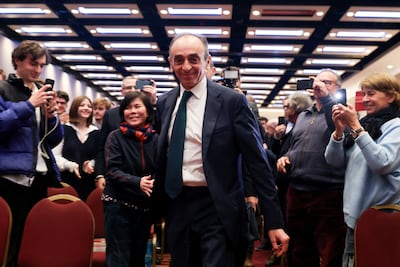President Emmanuel Macron’s re-election campaign is quietly gathering momentum in France, with a two-month "listening exercise" planned to prepare the ground for a battle with the far right.
Mr Macron, 43, is yet to formally enter the race, but his centrist party is already using his image to gather donations for the April election.
He faces potential attacks from extreme-right pundit Eric Zemmour, nationalist rival Marine Le Pen, a yet-to-be-determined nominee of the centre-right Republicans, and numerous candidates to his left.
A series of leaflets recently published by Mr Macron's party seek to defend his record, describing him as a president who, since he took office in 2017, has “restored France’s place as a great nation”.
With immigration and security likely to be major themes of the election, the party literature praises Mr Macron for increasing police numbers and shutting down mosques with links to radical Islam.
It describes Mr Macron as having reinforced Europe’s borders “to respond to the migration challenge and ensure our security”.
Mr Macron has taken a relatively hard line on migration amid recent crises in Afghanistan and Belarus.
But a debate among centre-right candidates blamed the president for enabling Mr Zemmour’s rise by failing to get a grip on security.
Mr Zemmour has described Islam as incompatible with France and called for names of foreign origin, such as Mohammed, to be banned.

Race heats up
Polls show the two-round election could end in a run-off between Mr Macron on one side and either Mr Zemmour or Ms Le Pen on the other.
The president would be favoured to win such a contest, but Mr Zemmour’s rise has thrown an unpredictable element into the race. Public discontent that exploded in the Yellow Vest protests of 2018 and 2019 resurfaced in part during recent rallies against Covid-19 restrictions.
Like Mr Macron, Mr Zemmour has yet to formally enter the race, while Ms Le Pen is a confirmed candidate for the far-right National Rally party.
The Republicans will choose their nominee next month, with the EU’s former Brexit negotiator Michel Barnier among the candidates taking a tough stance on immigration.
On the left, Paris Mayor Anne Hidalgo is the candidate of the Socialist Party, while Yannick Jadot is running under an environmentalist banner.
Mr Macron’s party touts his support for the EU’s 2050 carbon neutrality goal and his criticism of former US president Donald Trump for leaving the Paris climate agreement.
The French leader recently used the launch of a France 2030 agenda to call for a €1 billion ($1.16bn) investment in new nuclear reactors.

The listening exercise by Mr Macron’s La Republique En Marche (Republic on the Move) party was formally launched last week.
Activists will go door-to-door asking voters what they would do if they were president and what had most disappointed them during Mr Macron’s term.
They will canvass additional views with public meetings, phone banks and an online questionnaire.
The two-month tour is aimed at “hearing your opinions and feelings on the five years of our majority: what we’ve done well, what hasn’t worked, what still needs to be done”, the party said.
Party activists will report back in January, three months before voters go to the polls in the first round of the election.
Once the presidential race is over, En Marche will have to defend its parliamentary majority in separate legislative elections.
It took control of the National Assembly in 2017 after Mr Macron was elected president, but has largely failed to put down local roots since then.
A failure to hold the majority could limit Mr Macron’s power even if he wins a second term. Some previous French presidents, including Jacques Chirac and Francois Mitterrand, had to work with majorities from opposing parties.


